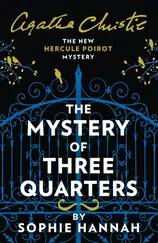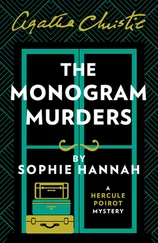Simon frowned. ‘You don’t honestly think you and Harbard writing your books and articles is going to stop things like this from happening? Or make it easier for those who are left behind? ’
‘I can’t bring people back from the dead, obviously,’ said Hey. ‘But I can try to understand, and understanding always helps, doesn’t it?’
Simon was doubtful. Would he feel better if he understood why Charlie, in response to his suggestion that they get married, had burst into tears, screamed obscenities at him and thrown him out of her house? Eternal confusion might be preferable; some things were too hard to face up to.
‘Anyway, whether you approve or not,’ said Hey, with a small, apologetic shrug. ‘Keith and I decided to devote ourselves, research-wise, to familicide. That was four years ago. At this moment in time, we’re two of a handful of experts on the subject in the UK. From what I know about Geraldine and Lucy Bretherick’s deaths, they don’t fit in with any family annihilation model that we’ve come across in our research. Not at all.’
‘What?’ Simon’s hand was in his jacket pocket, fumbling for his notebook and pen. ‘You’re saying you don’t think Geraldine Bretherick was responsible for the two deaths?’
‘No,’ said Hey unequivocally.
‘Harbard disagrees,’ Simon pointed out.
‘I know.’ For a second, Hey looked stricken. ‘I can’t talk sense into him, however hard I try. He’s going to write a misleading, entirely wrong-headed book, and it’s all my fault.’
‘How?’
Hey rubbed his face with his hands, as if he was washing. ‘Familicide’s not like murder, that’s the first thing you need to understand. People commit murder for a variety of reasons-it’s a crime with an extensive motive pool. Whereas you’d be surprised to discover how few prototypes there are for family-annihilation killings. Few enough for me to run through them all before dinner.’ Hey glanced at his watch. ‘First off, there are the men who kill their entire families-wives, children, themselves-because they’re facing financial ruin. They can’t cope with the shame, the sense of failure, the disappointment and disgrace they imagine their families will feel. So they choose death as the better option. These are men who have always been perceived as-and indeed, have been -loving, caring fathers and husbands. They can’t go on-the inevitable alterations to their self-image would be too painful-and they can’t envisage a life for the family with them gone. They view the murders as their final act of care and protection, if you like.’
‘They’re usually middle-class?’
‘Right. Middle, upper-middle. Good guess.’
‘It wasn’t. I read it in your article, yours and Harbard’s.’
‘Oh, right.’ Hey looked surprised but pleased. ‘Okay, second model: the men like Billy’s prison colleague, who kill their children to take revenge on former partners who’ve left them, wives who are planning to leave them or have been unfaithful. These instances of familicide usually come from the opposite end of the social spectrum-men with low incomes, manual jobs if they’ve got jobs at all.’
‘You make it sound as if there are plenty of cases to choose from. It must be an incredibly rare crime.’
‘One familicide in the UK every six weeks. Not as rare as you might think.’ Hey paced the floor, from one end of his Space Invader rug to the other. ‘The second prototype-the vindictive, vengeful family annihilator-sometimes he kills the woman too. The kids and the wife or partner. It varies. Depends on whether he thinks killing her would be a better revenge than leaving her alive once her children are dead. If there’s another man involved, he might not want his rival to get his hands on the woman that he regards as his property, just as he doesn’t want his children to end up calling another man “Dad”. Sometimes he wants to end his wife or girlfriend’s bloodline: he doesn’t want anything of her to live on, which is why he has to kill the children too, his own children.’
‘You keep saying “he”. Are family… annihilators always men?’ Simon asked.
‘Almost always.’ Hey perched on the arm of his sofa. ‘When women do it-traditionally-it’s for different reasons. Women don’t kill their children to avoid facing bankruptcy; as far as we know, that’s never happened, not once. And the revenge-motivated familicide is male, not female. Simple reason: even in our supposedly equal modern society, children are still seen as belonging more to the woman than the man. He kills them as a way of destroying something that’s hers. Very few women would see their children as belonging more to their husbands than to themselves, so they wouldn’t be destroying his treasured possessions-only their own. See what I mean?’
‘So when women do it, what’s their motive?’ asked Simon. ‘Depression?’
Hey nodded. ‘Keith’s told me about the diary Geraldine Bretherick left, and, granted, it sounds as if she was seriously dissatisfied. I’m not sure if she was depressed. But she wasn’t delusional, and most mothers who kill their children are. They tend to have a history of depression dating back to childhood, linked, often, to disastrous family backgrounds and a total lack of support networks.’
‘What kind of delusions?’ asked Simon. He was wondering about William Markes, a man no one had been able to find.
‘All kinds. Some believe that they and their children are suffering from terminal illnesses,’ said Hey. ‘Murder and suicide are their escape routes, to avoid prolonged suffering. They’re not ill at all, of course, but they’re absolutely convinced they are. Or else the women are suicidal, and feel so protective of their children, so attached to them, that they can’t kill themselves and leave the children alive: that feels too much like abandonment.’
Simon wrote all this down.
‘I haven’t seen Geraldine Bretherick’s diary, but Keith’s described it to me and shown me passages from it. It’s full of complaints about her daughter, right?’
‘Pretty much,’ said Simon.
‘The women who kill their children and then commit suicide, they don’t express negative feelings about their children beforehand. Love is their motivation, albeit a twisted love. Not resentment. At least, that’s true of every case I’ve ever heard of.’
‘So…’ Simon tapped his pen against his leg, thinking. ‘Harbard should know all this. Yet he’s convinced Geraldine Bretherick-’
‘He’s convinced because he wants to be.’ Hey’s pained expression had returned. ‘It’s my fault.’
‘How so?’
‘There was a case a while ago, in Kenilworth, Warwickshire-a man whose business empire was falling apart. He owed millions. Meanwhile his wife and four teenage kids had no idea there was a problem, and were busy splashing out on credit cards, booking holidays, buying cars, taking their wealth and privilege for granted. The wife didn’t work, she didn’t think she had to. She thought she had a rich husband.’
‘He killed them all?’ Simon guessed.
‘Stabbed them in their beds while they were sleeping, then hanged himself. His sense of identity collapsed when he was forced to confront his inability to provide for his family. Keith and I were talking about it one night, I’d had a bit to drink… I said it was more and more common for the woman to be the main breadwinner. Not only the breadwinner, but the one who administrates the family finances. I wondered aloud-and, believe me, I wish I hadn’t-if one day we would start to hear about cases of women who killed their husbands and children for the same reason.’
‘Do you think that’s likely?’ asked Simon.
‘No!’ Hey looked cornered, bewildered. ‘I don’t. If it was going to happen, it would be happening already. That’s my hunch. I was just… idly speculating. But Keith’s eyes lit up. He said he was sure I was right-it would start to happen. He seemed… I almost had the impression he wanted it to happen. No, that’s a terrible thing to say, of course he didn’t. But I could tell he’d latched on to the idea. Women have always borne the burden of domestic responsibility pretty much single-handedly, he said. Which is true, even in our so-called enlightened society. Women take responsibility for the home and the kids, and often view their husband as an extra child, someone else to be looked after. Men used to be the ones who brought in the money, but even that’s changing. Women are keen to work outside the home now, which means men get to have it even easier. More and more of us marry women who earn more than we do-’ Hey stopped suddenly. ‘Are you married?’ he asked.
Читать дальше












